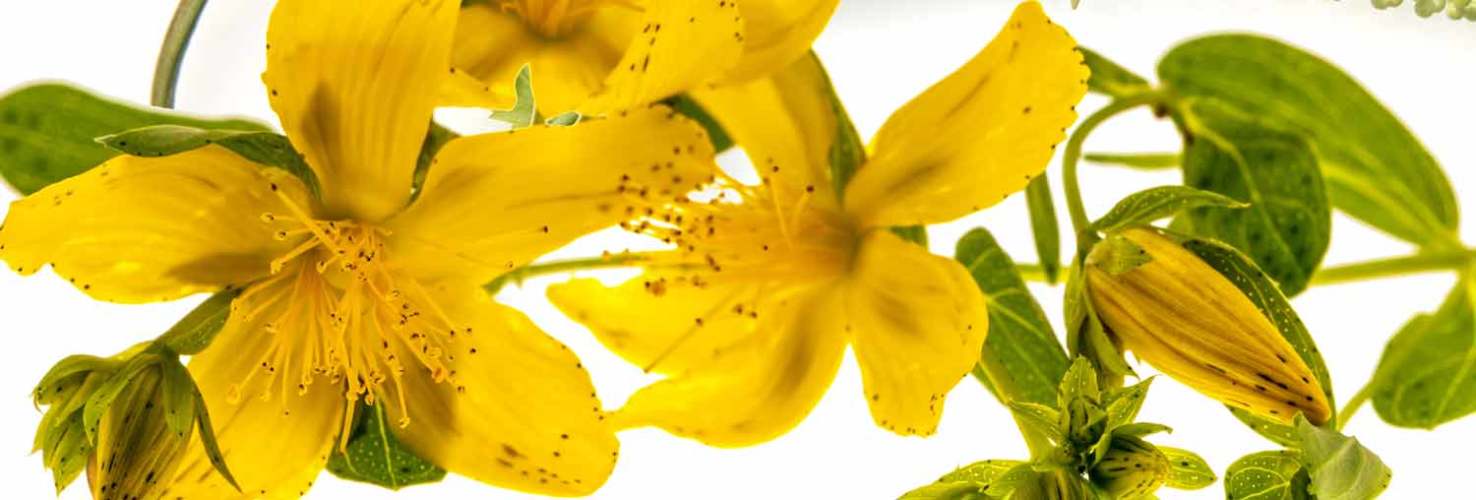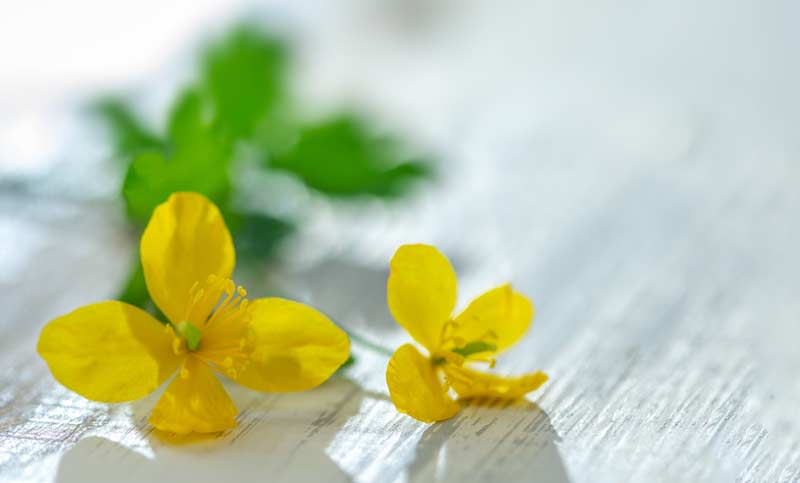St John’s Wort and the menopause

Author Miriam Ferrer, PhD Last updated 30th May 2020
- Ingredients & Nutrition
- Health Conditions
In this article, we look at St John’s wort, a herbal remedy that can help with low mood, especially during the menopause.
- What is St John’s wort
- What are the health benefits of St John’s wort?
- Can St John’s wort help with menopause?
- What are the side effects and advice when taking St John’s wort?
- St John’s wort products
- Summary
What is St John's Wort

St John’s wort (Hypericum perforatum) is a bushy perennial plant native to Europe and Asia that has lovely yellow flowers. It is said that it is named after St John the Baptist as the flowers come out around St John’s Day (24th June), which is also the time when they were traditionally harvested.
St John’s wort has been used as a remedy to help with nervous conditions for centuries. The medicinal use of the flowers was already documented by The Greeks and the Romans1.
The main active components of St John’s wort are the hypericins, which include hypericin among others, and the hyperforins, including hyperforin and derivates. It also contains flavonoids (like kaempferol and quercetin glycosides), caffeic and chlorogenic acids, and a volatile oil. The flowering yellow tops, where most of the main active molecules are found, are generally dried before putting them into a liquid solvent, which is then used to make tablets or capsules2.
What are the health benefits of St John's Wort?
St John’s wort is reputed to possess sedative and astringent properties. It has been used traditionally for the treatment of a range of nerve-related disorders such as anxiety and menopausal neurosis, and in topical preparations for the treatment of wounds2.
Antidepressant activity

The most well-known use for St John’s wort is to help with mild depression and low mood disorders.
A Cochrane systematic review evaluated the effect of St John’s wort on depression. The analysis looked at twenty-nine randomised controlled trials: some of them compared St John’s wort to a placebo and some of them to standard antidepressant treatments. Overall, the authors concluded that St John’s wort extracts can be beneficial in patients with mild depression, and that they generally have less side effects than more conventional antidepressant medications3.
It is not clear how St John’s wort exerts its beneficial antidepressant effect. In vitro studies have demonstrated that it can affect the activity of several neurotransmitters systems such as dopamine or serotonin, indicating that the molecular mechanisms are quite complex4. While isolated hyperforin shows antidepressant activity, extracts without it also show beneficial effect, which confirms that the antidepressant effect of St John’s wort is due to a combination of several phytochemicals5.
Can St John’s wort help with menopause?
Common symptoms of menopause include low mood and anxiety, which can be addressed by St John’s wort extracts. Several studies have looked specifically at the effect of St John’s wort in menopausal women, and it seems that St John’s wort can help not only with the mood changes, but also with the more physiological symptoms such as hot flushes6,7. A double-blind, randomised, placebo-controlled study with 100 Iranian women showed that St John’s wort decreased hot flushes frequency after 8 weeks intervention8.
Treatment of wounds and other skin issues

St John’s wort preparation such as oils and tinctures (alcoholic extraction) have been used for the treatment of minor wounds and burns, bruises and contusions9. The potential anti-inflammatory and antimicrobial effect of compounds such as hypericin and hyperforin suggest that St John’s wort topical applications could be beneficial for some dermatological indications10, although the mechanism of action is not clear.
What are the side effects and advice when taking St John's Wort?
St John’s wort is relatively safe, and side effects are rare and mild, and include minor gastrointestinal problems or allergic reactions. People with light skin may suffer from photosensitisation (sunburn-like symptoms) under intense sunlight11.
St John’s wort can interfere with a wide range of commonly prescribed medicines, such as warfarin, statins, oral contraceptives or anticancer agents. Therefore, it is very important that you talk to your doctor or pharmacist if you are thinking about taking St John’s wort and are under prescribed medication.
St John’s wort can induce expression of cytochrome P450 family enzymes and the P-gp drug efflux transporter. These systems are natural ways that the body uses to get rid of medicines and other products. If their activity increases, it can decrease the amount of medicine in your body12.
Due to the effect of St John’s wort in low mood and depression, it should not be taken if you are taking antidepressant medication11.
St John’s wort should not be used during pregnancy or breastfeeding. St John’s wort should not be taken by children11.
St John’s wort products
St John’s wort is available on prescription in many European countries, but not in the UK. In the UK, products containing St John’s wort are regulated by the MHRA under the THR (Traditional Herbal Remedy) license scheme.
Unlicensed St John’s Wort products and dietary supplements, although sold legally, are not checked for quality or safety, and they may have incomplete or inaccurate safety information.
Authorised licensed products meet the required safety standards.
Summary
St John’s wort is a herbal remedy that can help with low mood, especially during the menopause. Always look for the THR hallmark to ensure you are taking a quality product that is safe to use.
References
- Lawvere S & Mahoney MC. St John’s wort. Am Fam Physician. 2005; 72(11): 2249-2254
- European Scientific Cooperative on Phytotherapy. ESCOP monographs The Scientific Foundation for Herbal Medicinal Products. Online series. Hiperici herba (St John’s Wort). Exeter: ESCOP; 2018.
- Linde K, Berner MM, Kriston L. St John's wort for major depression. Cochrane Database Syst Rev. 2008;2008(4):CD000448.
- Butterweck V. Mechanism of action of St John's wort in depression : what is known?. CNS Drugs. 2003;17(8):539‐562.
- Butterweck V, Christoffel V, Nahrstedt A, Petereit F, Spengler B, Winterhoff H. Step by step removal of hyperforin and hypericin: activity profile of different Hypericum preparations in behavioral models. Life Sci. 2003;73(5):627‐639.
- Eatemadnia A, Ansari S, Abedi P, Najar S. The effect of Hypericum perforatum on postmenopausal symptoms and depression: A randomized controlled trial. Complement Ther Med. 2019;45:109‐113.
- Al-Akoum M, Maunsell E, Verreault R, Provencher L, Otis H, Dodin S. Effects of Hypericum perforatum (St. John's wort) on hot flashes and quality of life in perimenopausal women: a randomized pilot trial. Menopause. 2009;16(2):307‐314.
- Abdali K, Khajehei M, Tabatabaee HR. Effect of St John's wort on severity, frequency, and duration of hot flashes in premenopausal, perimenopausal and postmenopausal women: a randomized, double-blind, placebo-controlled study. Menopause. 2010;17(2):326‐331.
- Wölfle U, Seelinger G, Schempp CM. Topical application of St. John's wort (Hypericum perforatum). Planta Med. 2014;80(2-3):109‐120.
- Barnes J, Anderson LA, Phillipson JD. St John's wort (Hypericum perforatum L.): a review of its chemistry, pharmacology and clinical properties. J Pharm Pharmacol. 2001;53(5):583‐600.
- EMA. Final Community Herbal monograph on Hypericum perforatum L., herba (Well-established medicinal use). EMA/HMPC/101304/2008. London, United Kingdom: European Medicines Agency; 2008.
- Nahrstedt A, Butterweck V. Lessons learned from herbal medicinal products: the example of St. John's Wort (perpendicular). J Nat Prod. 2010;73(5):1015‐1021.
